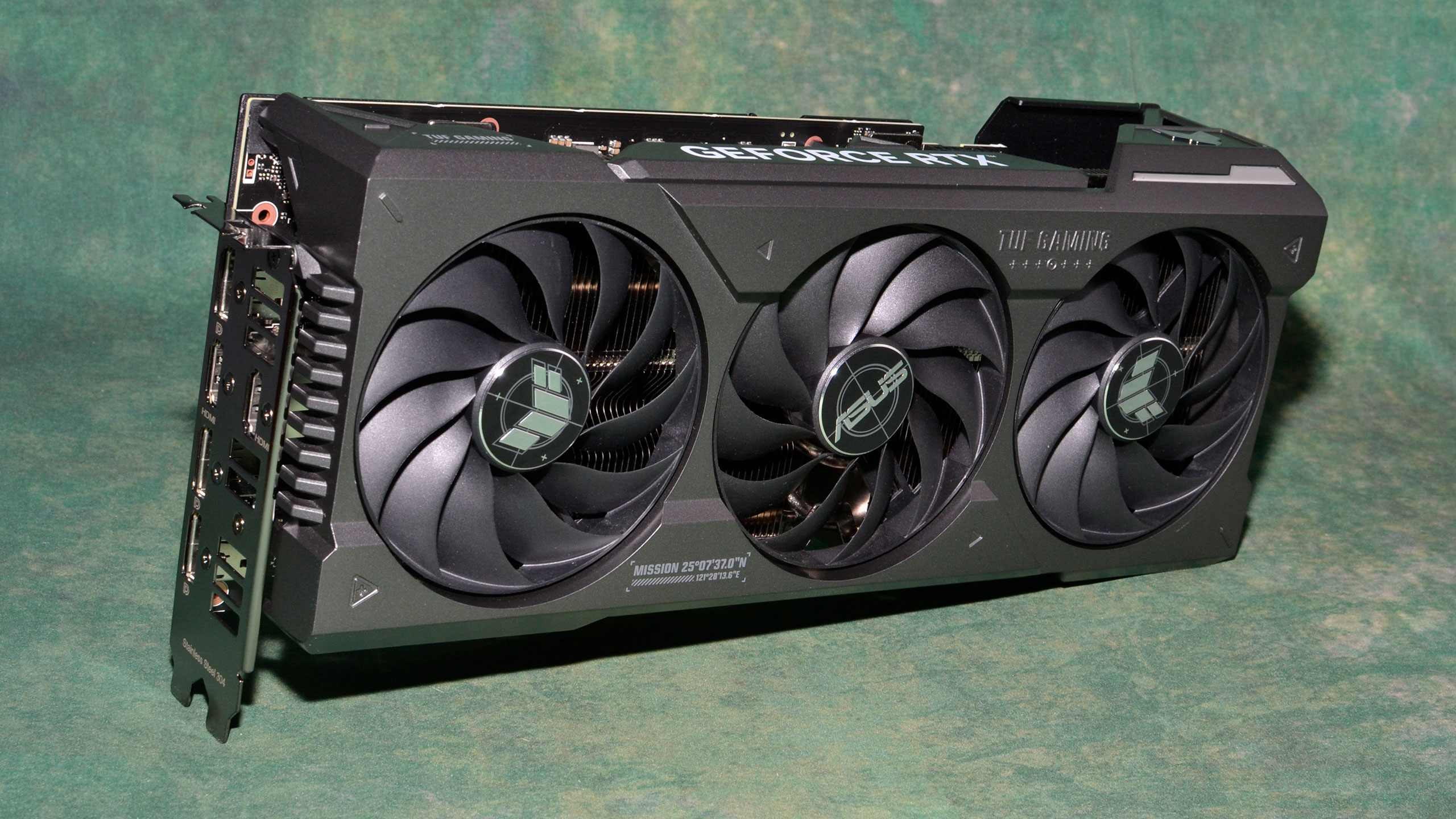Why you can trust Tom's Hardware
While 1440p may still be the sweet spot for a lot of gamers, anyone looking at a new graphics card costing $799 or more has a good chance of owning a 4K gaming monitor. Or if not, perhaps an ultrawide 3440x1440 display, which would land between our 1440p and 4K results (but closer to 2560x1440 than 4K). So our next stop is 4K ultra, which in the real world means a lot of newer games probably intend you to use upscaling.
VRAM can actually become a much bigger concern at 4K as well — see, why does 4K require so much VRAM? — but with 16GB of memory, the RTX 4070 Ti Super shouldn't have much to worry about in that arena. It's worth keeping an eye on the 4070 Ti numbers, though, to see just how much the extra memory bandwidth and capacity might be helping at 4K.
RTX 4070 Ti Super 4K Overall Performance
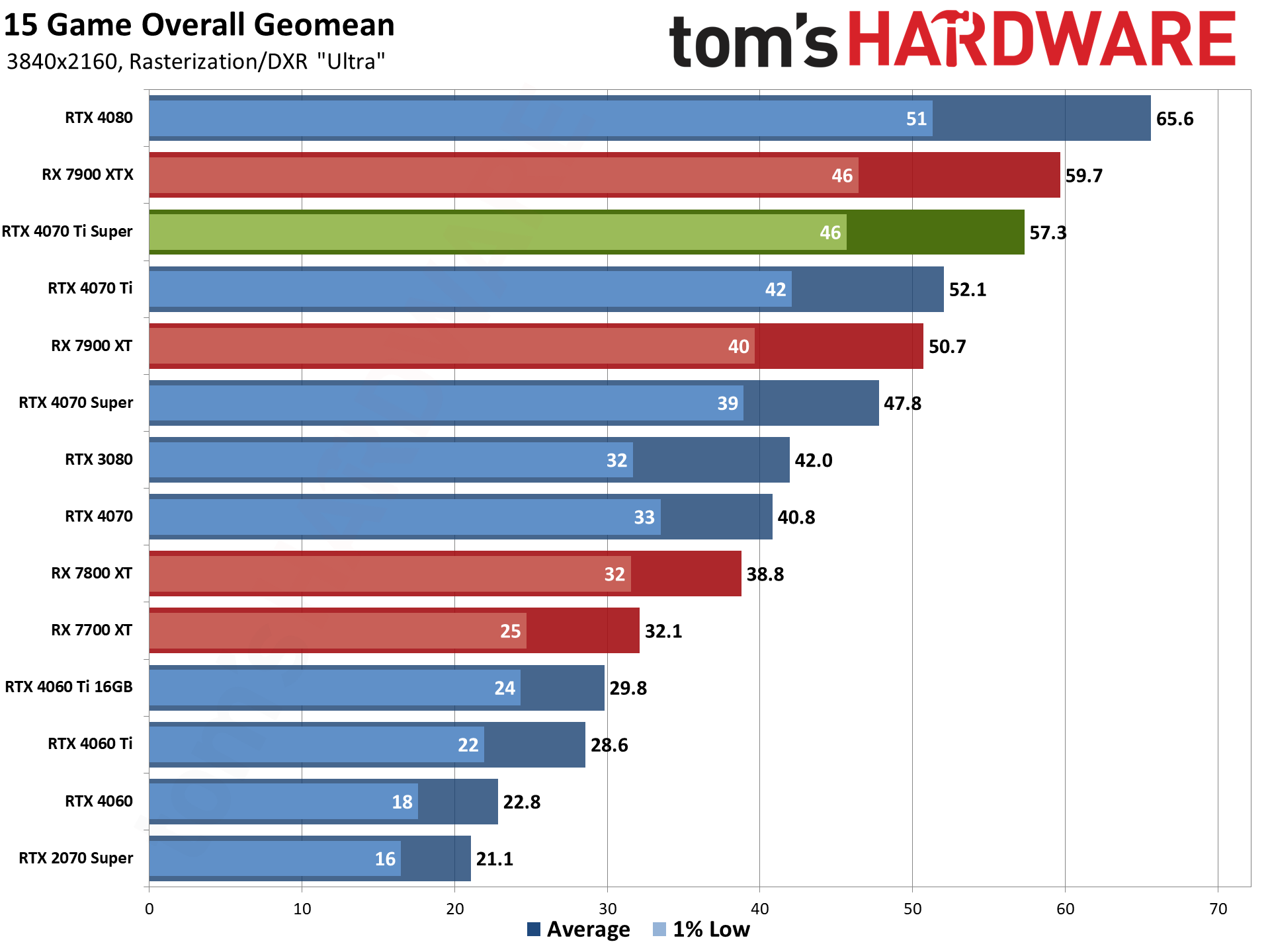
We noted on the previous page that higher resolutions could make the additional memory and bandwidth of the 4070 Ti Super more critical, and we start to see at least a little bit of that in our overall results. Here, the new GPU comes in 10% ahead of the 4070 Ti and 13% behind the 4080. It's fractionally closer to the 4080 now, in other words, though not as close as we might have thought based on the specs.
Clearly, compute still matters more than memory bandwidth and capacity in a lot of the games we're testing. The 4070 Ti Super has 10% more compute and 33% more memory than the vanilla 4070 Ti, while the 4080 has 10% more compute, 7% more bandwidth, and the same VRAM capacity. So wait, how does that work out to a 13% lead at 4K? The devil is in the details.
Nvidia officially lists the boost clock on the 4080 at 2505 MHz, versus 2610 MHz on the 4070 Ti Super. Across our full test suite, however, the 4080 averaged 2761 MHz compared to the Asus 4070 Ti Super's 2717 MHz. Do the math and that means in our real-world results, the 4080 averaged 17% higher actual computational performance. Probably at least some of that difference comes from the 320W TGP versus the 285W TGP.
What about the AMD matchup? AMD's RX 7900 XTX starts to pull away just slightly, with a 4% lead at 4K (versus a tie at 1440p). The 4070 Ti Super meanwhile still beats the RX 7900 XT by 14% overall, with a slightly higher gap this time (by 0.5%, though both figures round to 14%).
RTX 4070 Ti Super 4K Rasterization Performance
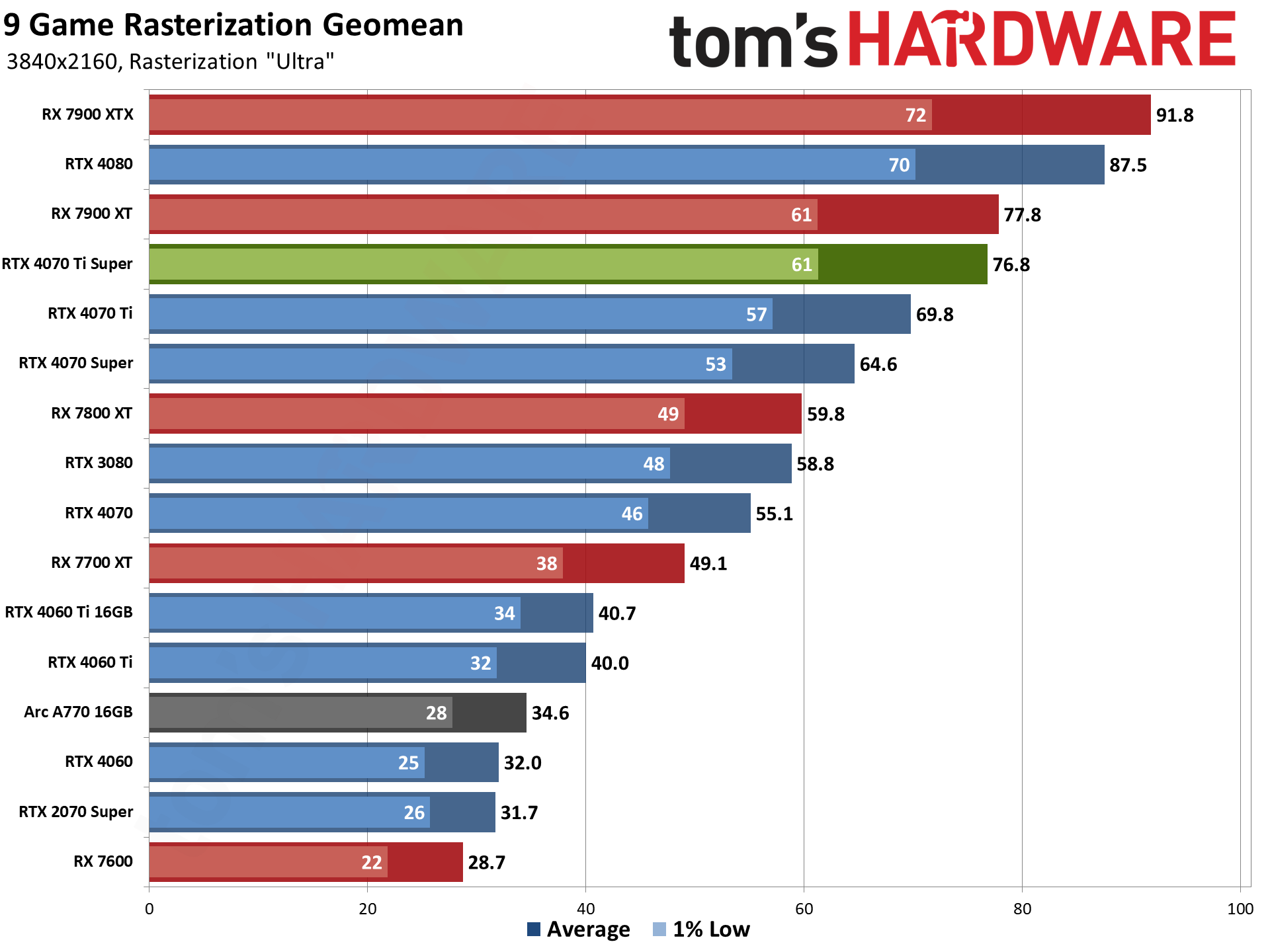
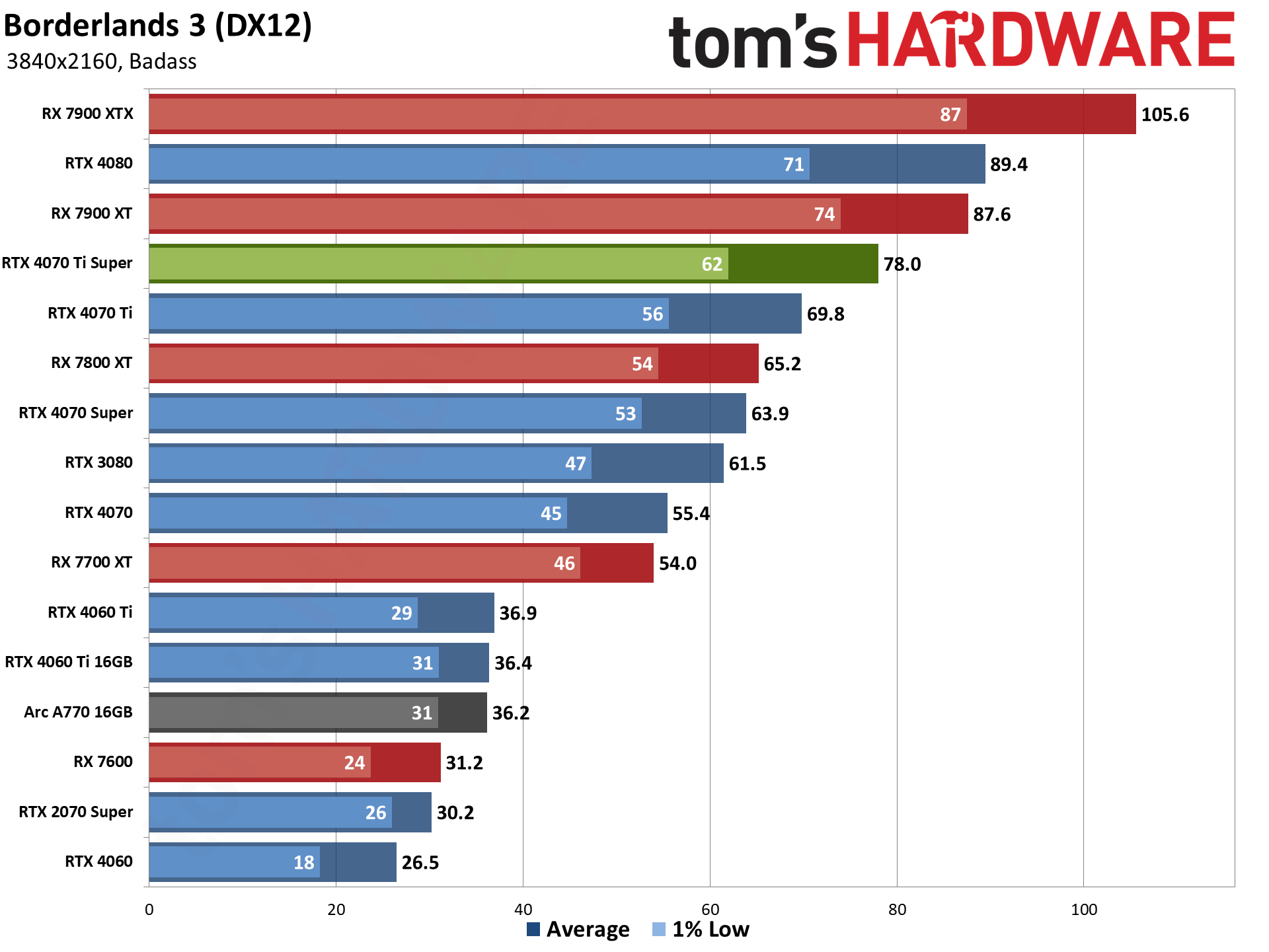
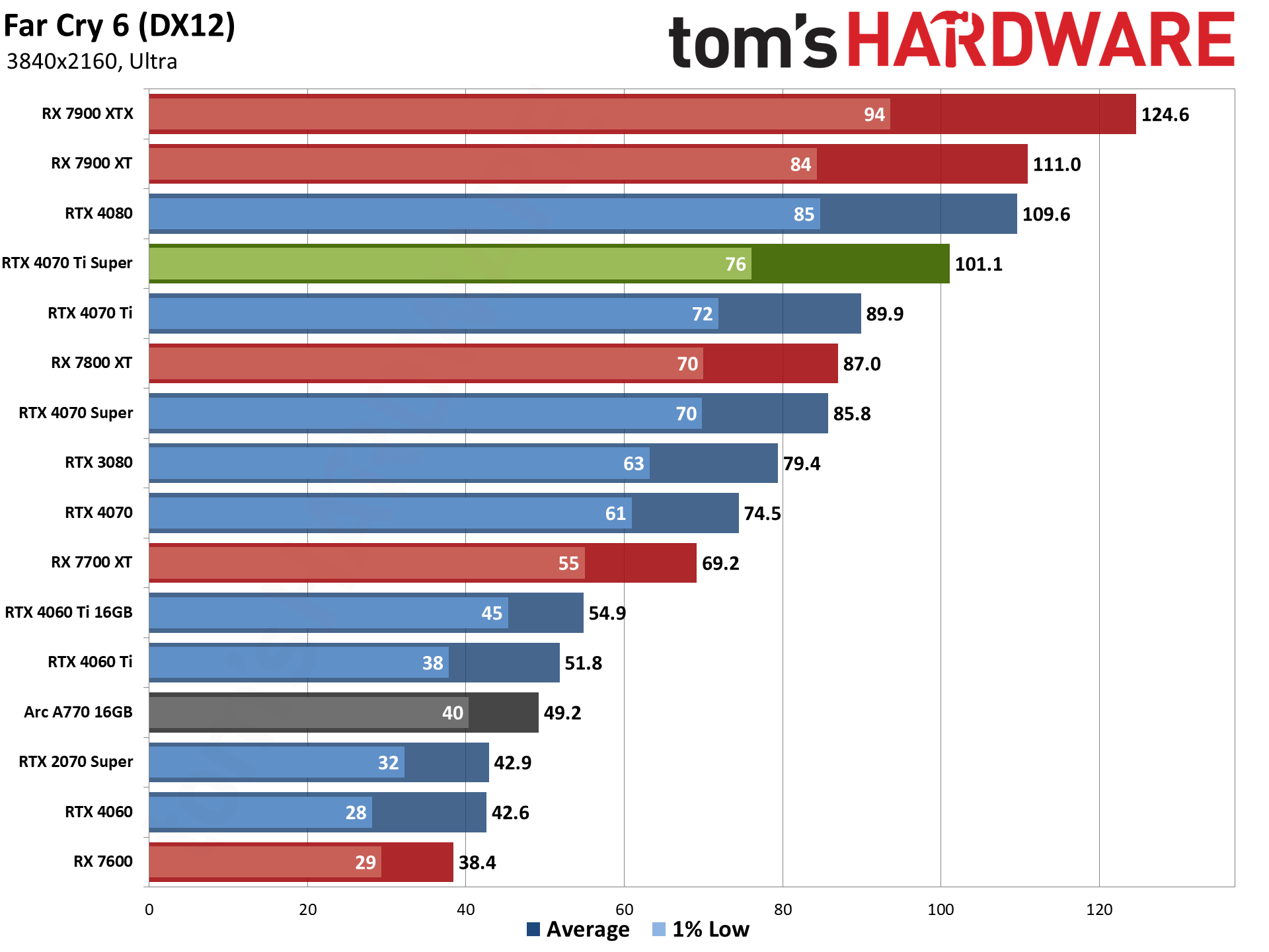
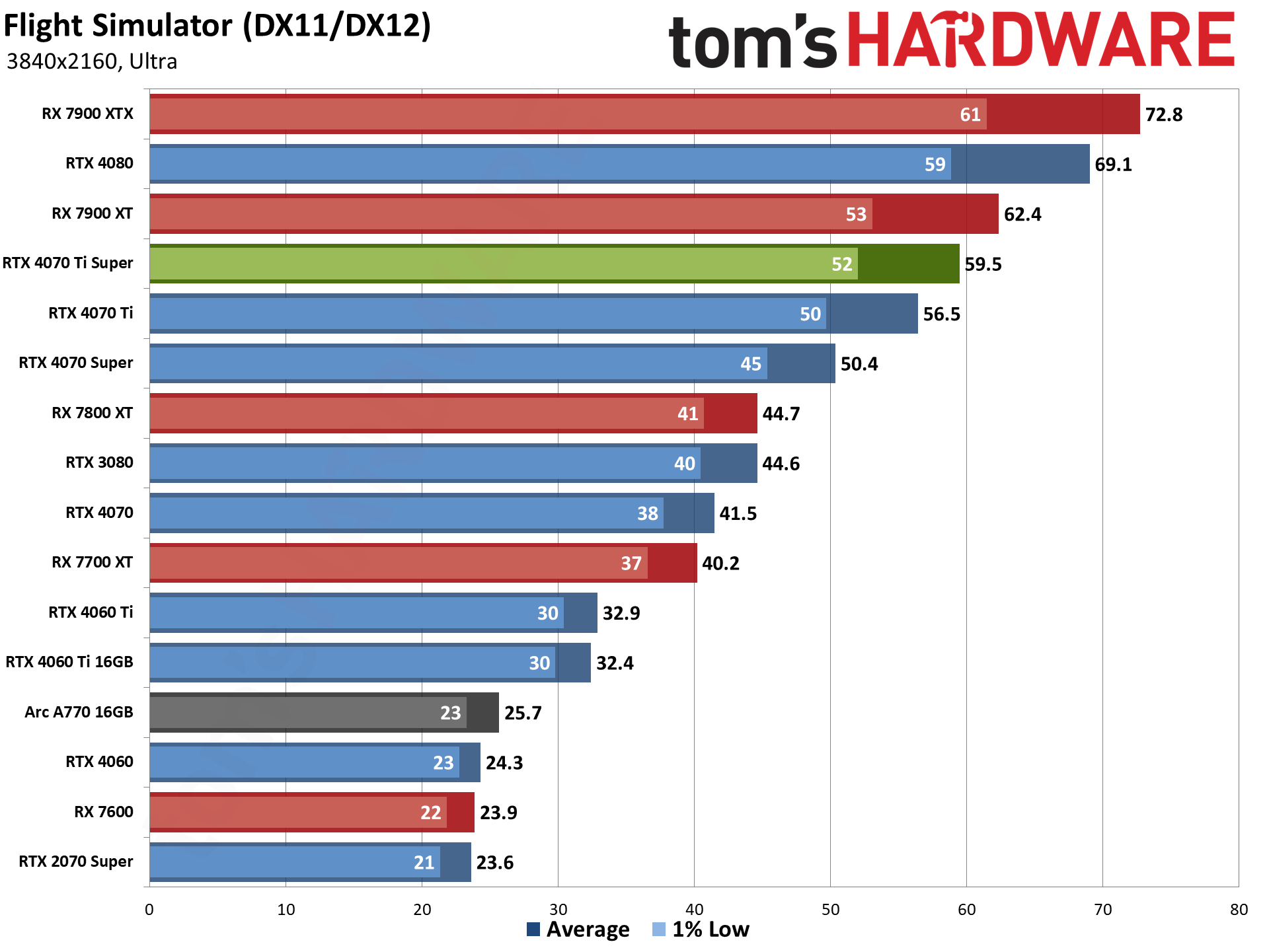
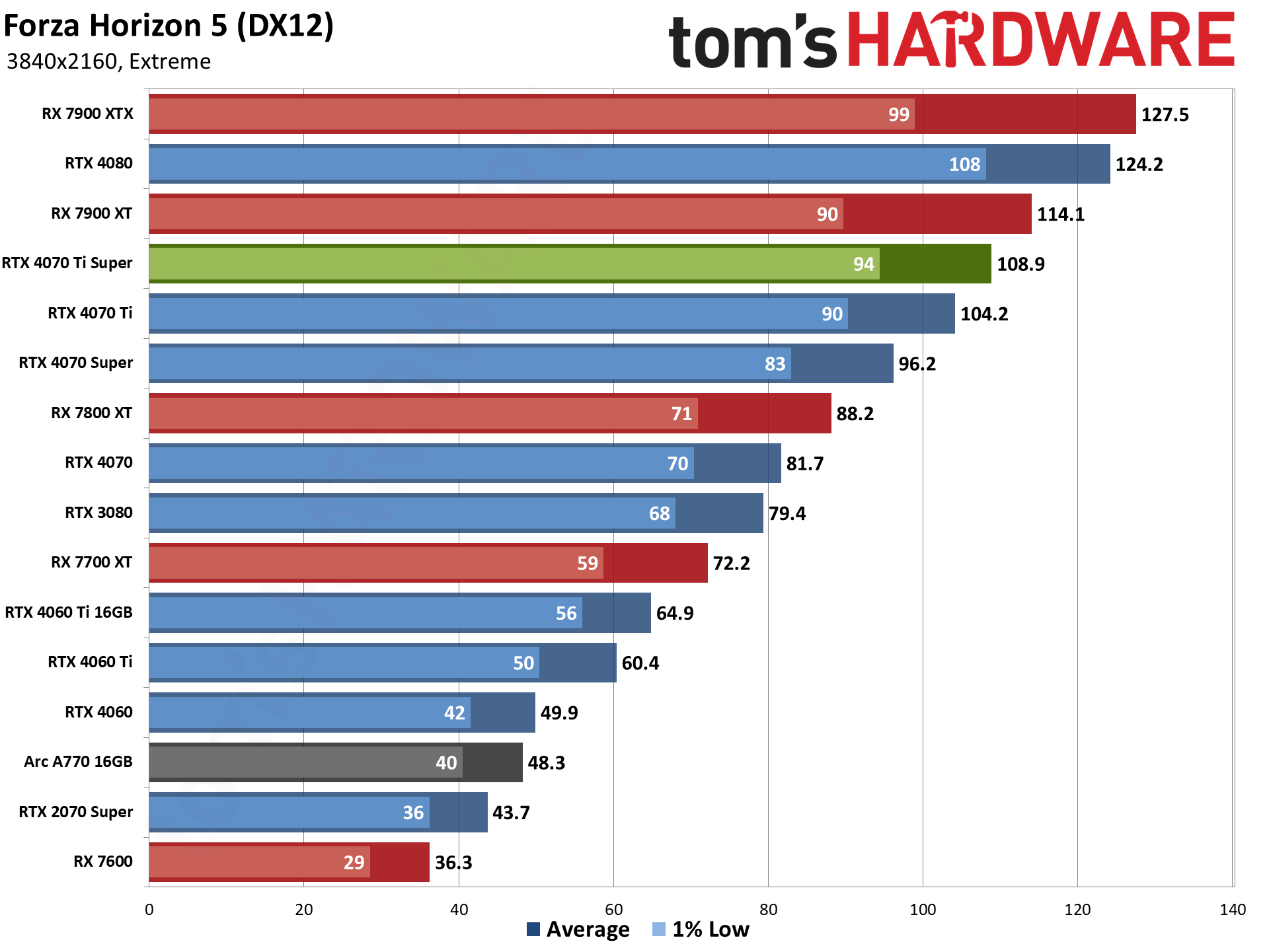
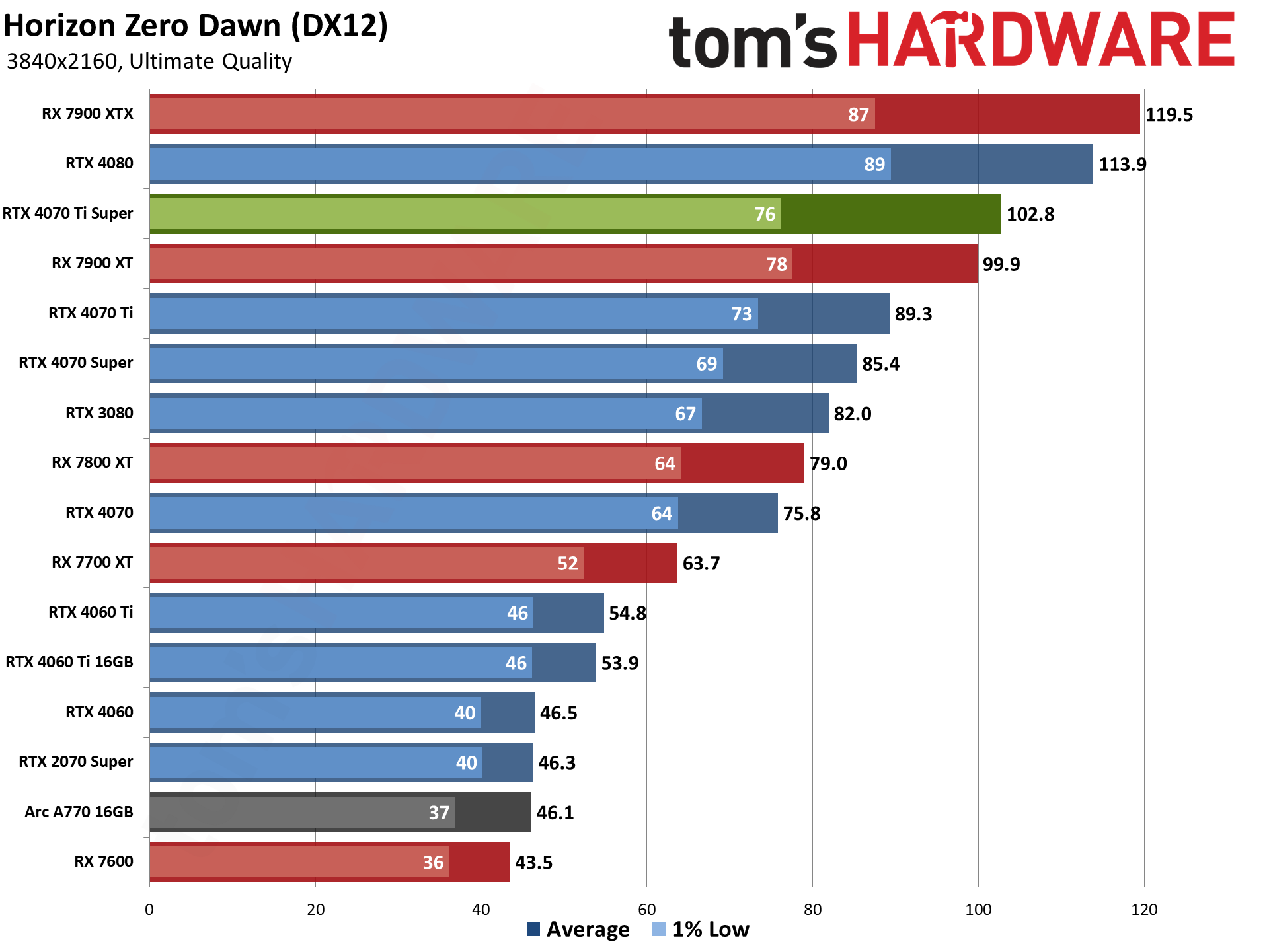
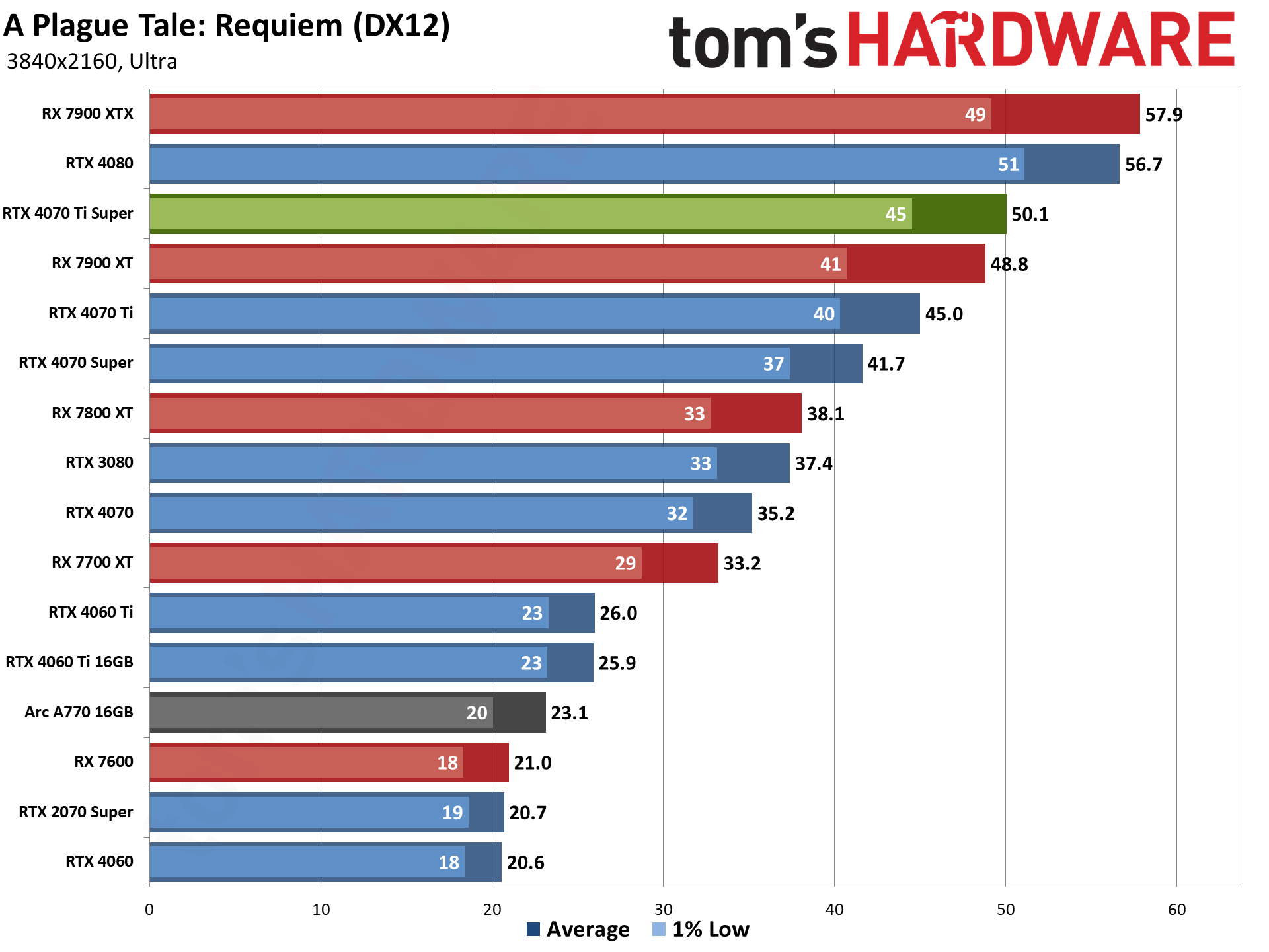
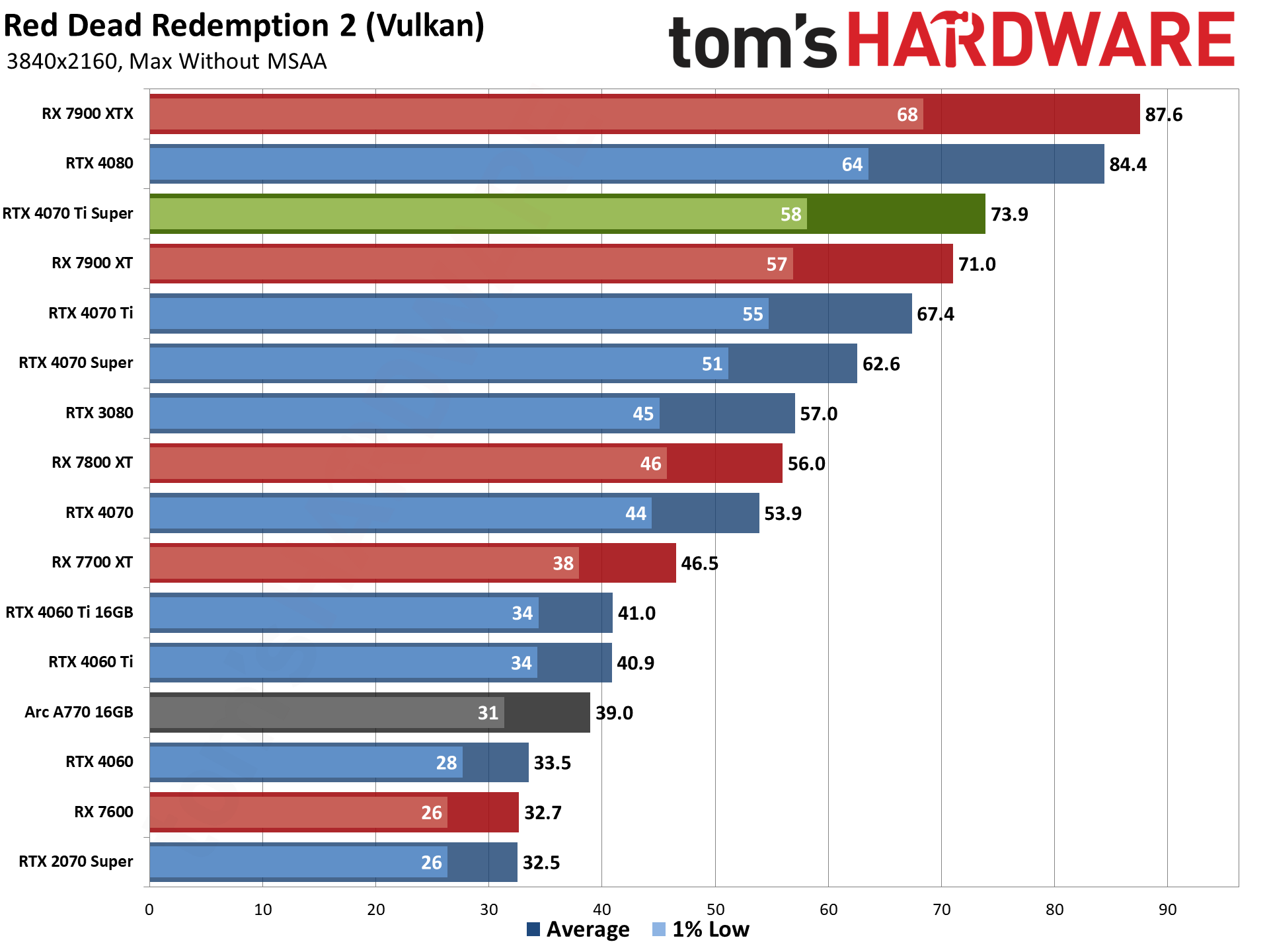
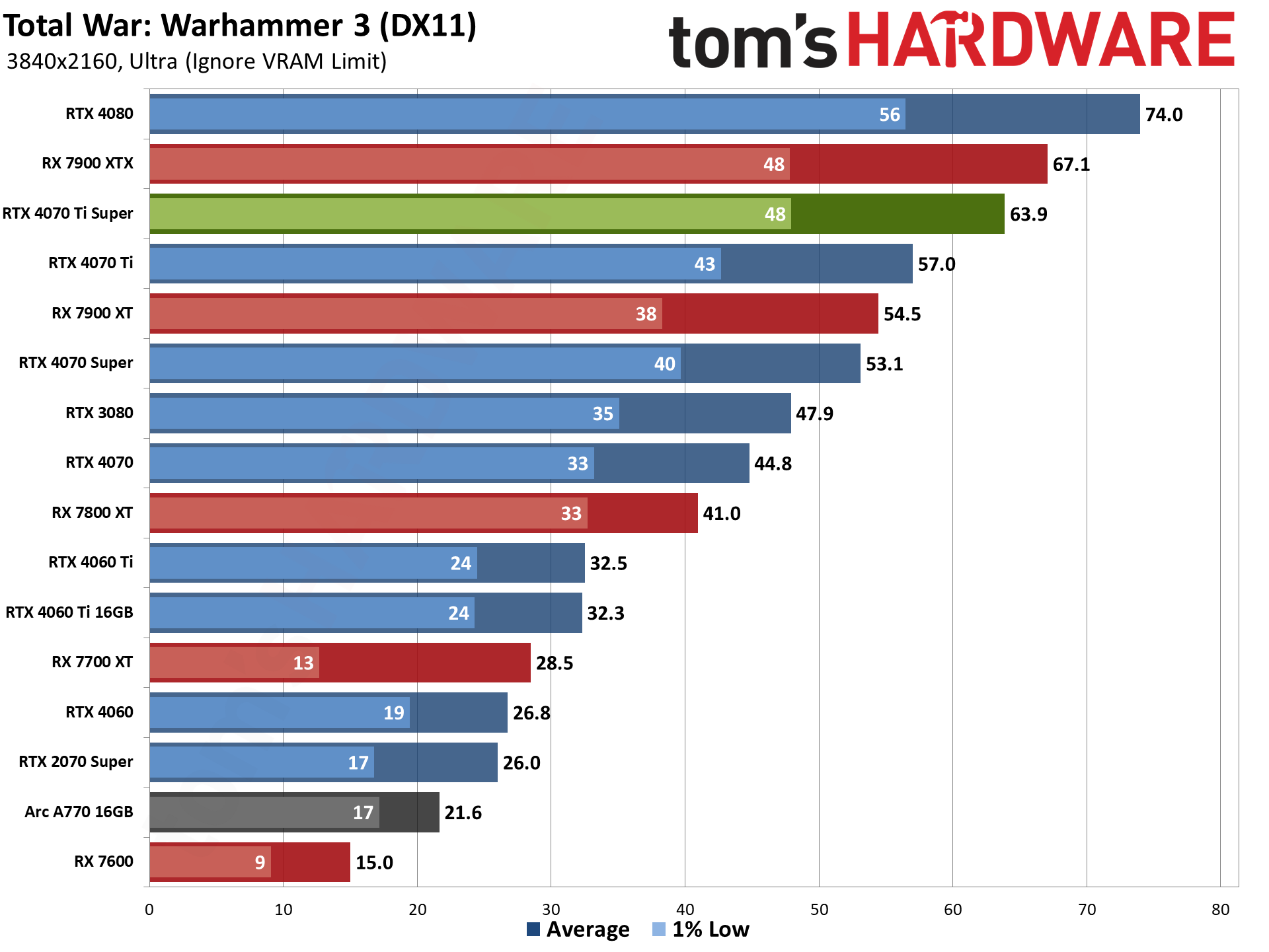
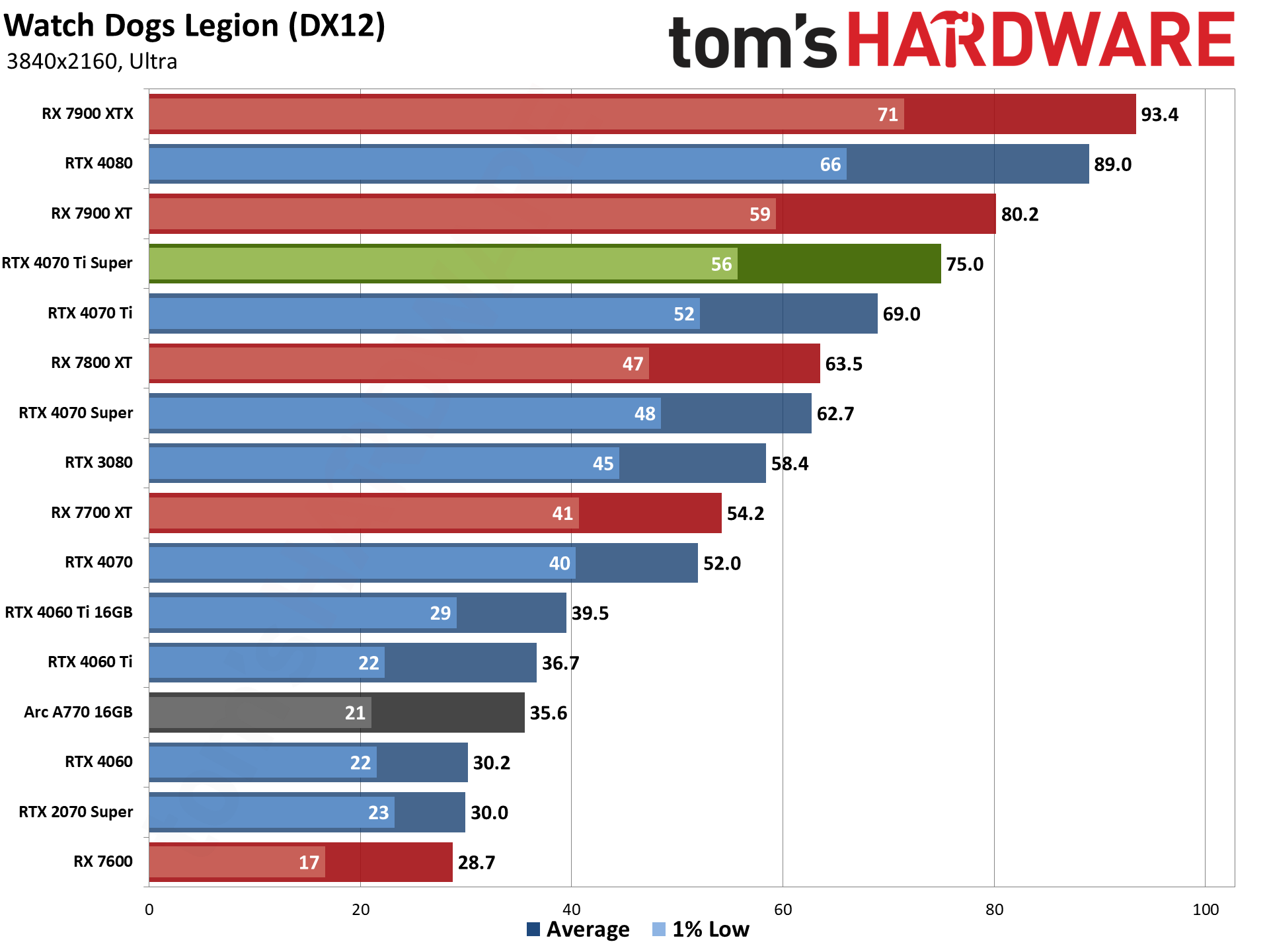
Looking just at rasterization performance, AMD again gains a bit of ground on the 4070 Ti Super. The 7900 XT is tied overall (vs. just slightly behind at 1440p), while the 7900 XTX is 20% faster (versus 12% faster at 1440p). The extra VRAM bandwidth appears to be helping AMD out more at 4K is our best guess, though compute may also factor into the equation.
Across the nine rasterization games, the 7900 XTX gets a clean sweep, leading by anywhere from 5% (Total War: Warhammer 3) to as much as 35% (Borderlands 3), with roughly half of the games showing a 20% or higher advantage for AMD's halo card. The 4070 Ti Super meanwhile leads the 7900 XT by up to 17% (TWW3 again), and trails by up to 11% (BL3 again), with the overall difference being just 0.3% in favor of Nvidia.
Older GPUs obviously aren't holding up very well, particularly at 4K. The RTX 4070 Ti Super delivers 30% higher performance than the RTX 3080 again, while the 2070 Super falls off the pace and the 4070 Ti Super is 142% faster now (compared to 128% faster in our 1440p testing).
RTX 4070 Ti Super 4K Ray Tracing Performance
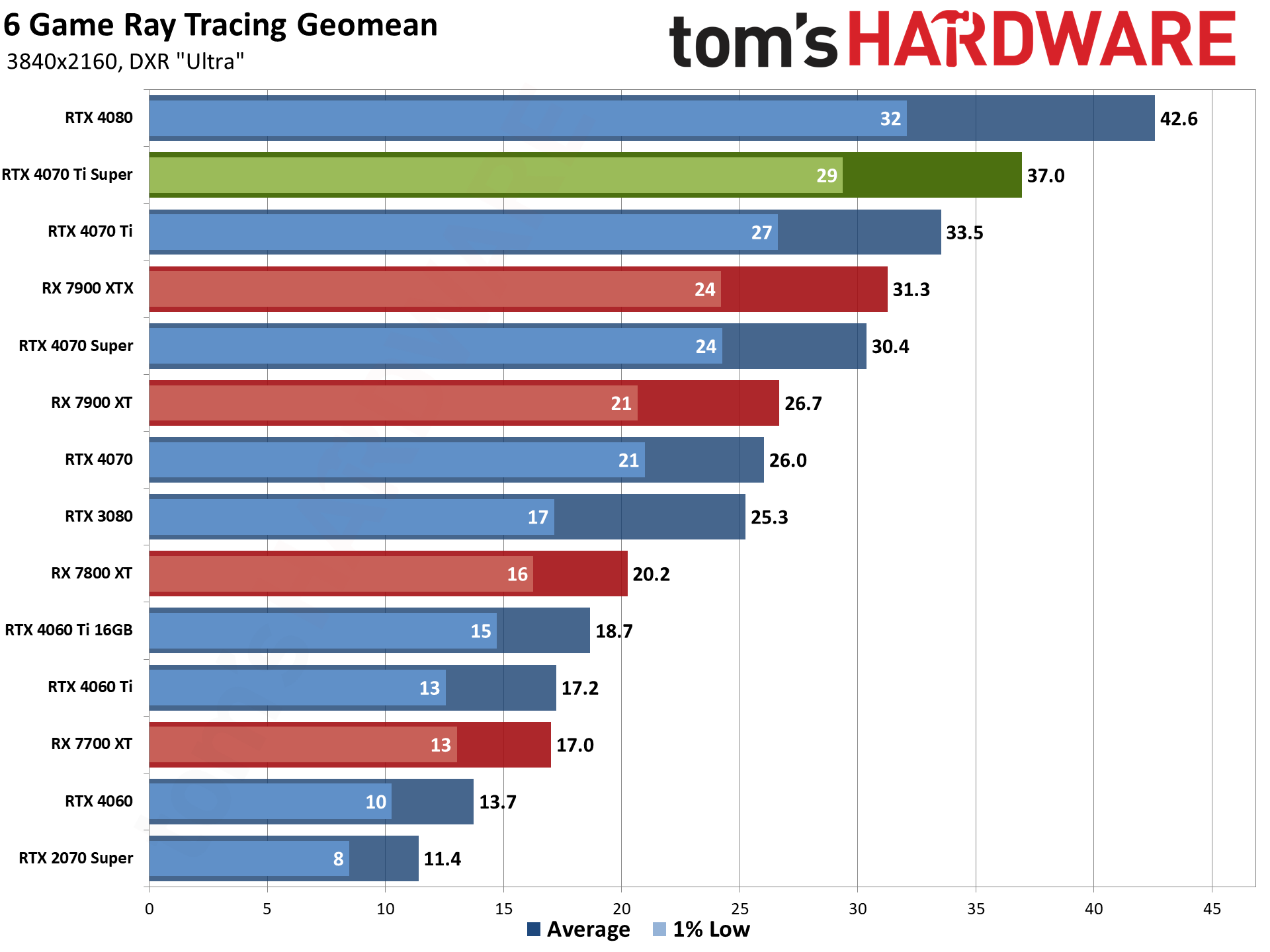
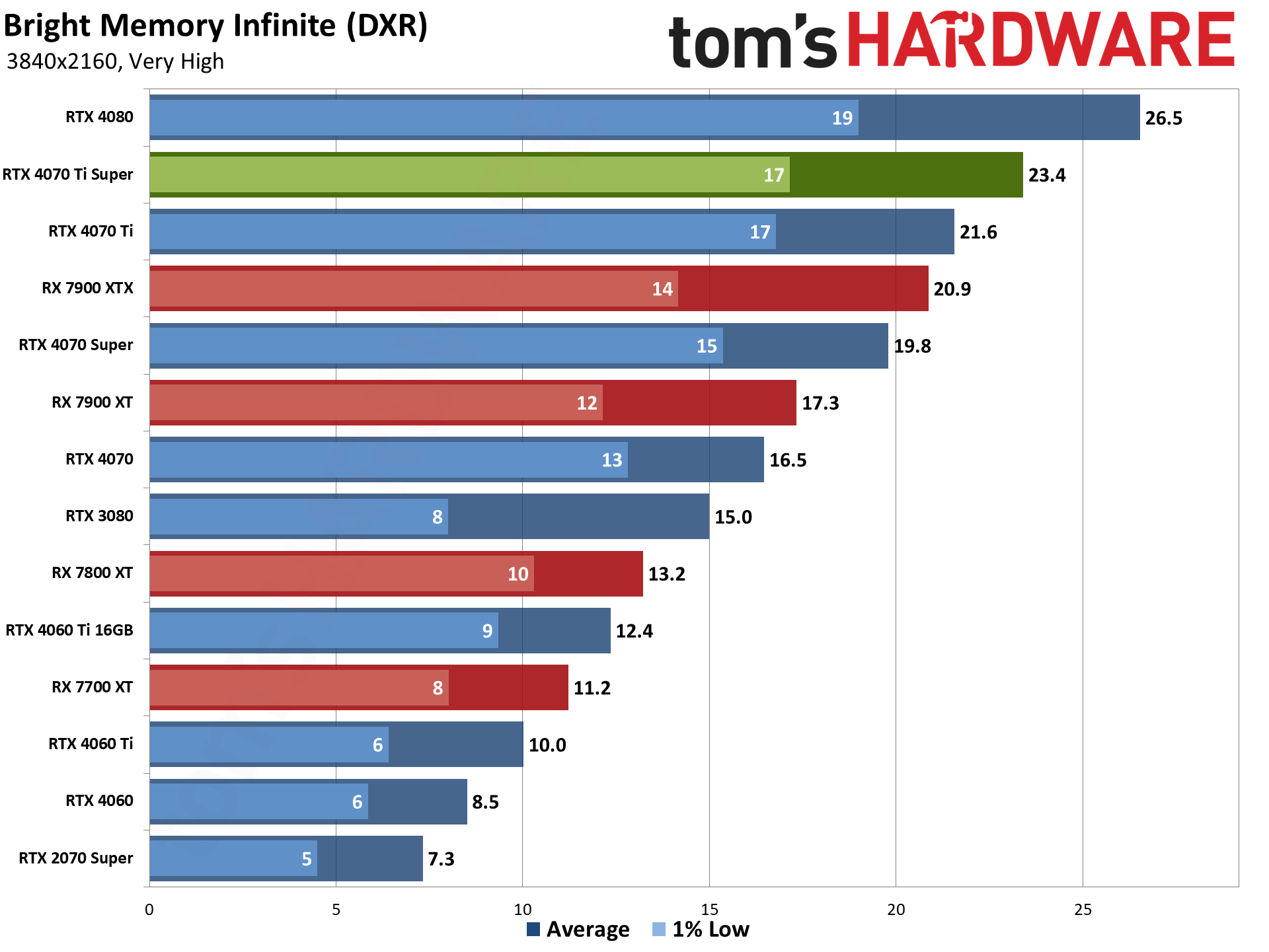
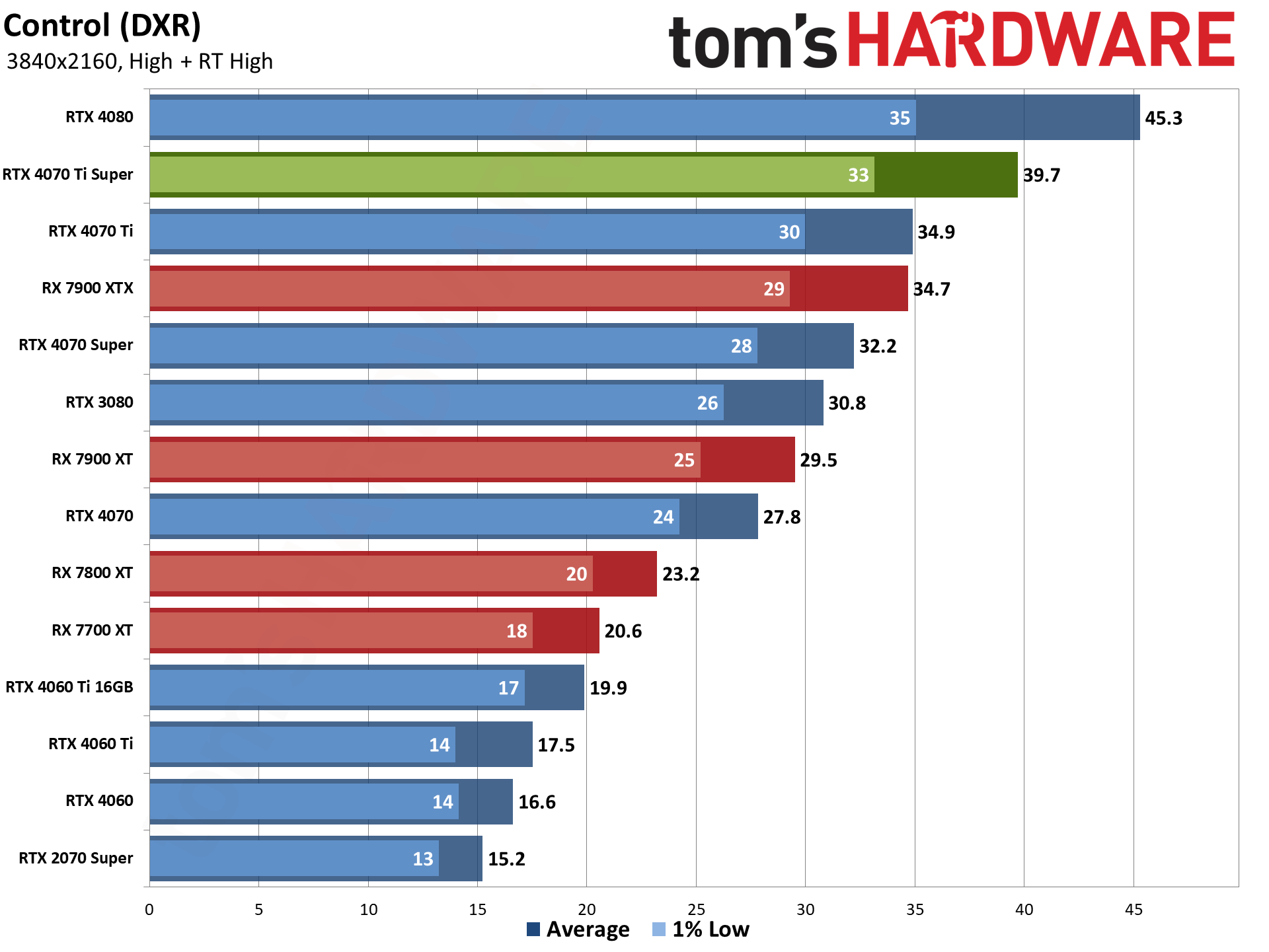
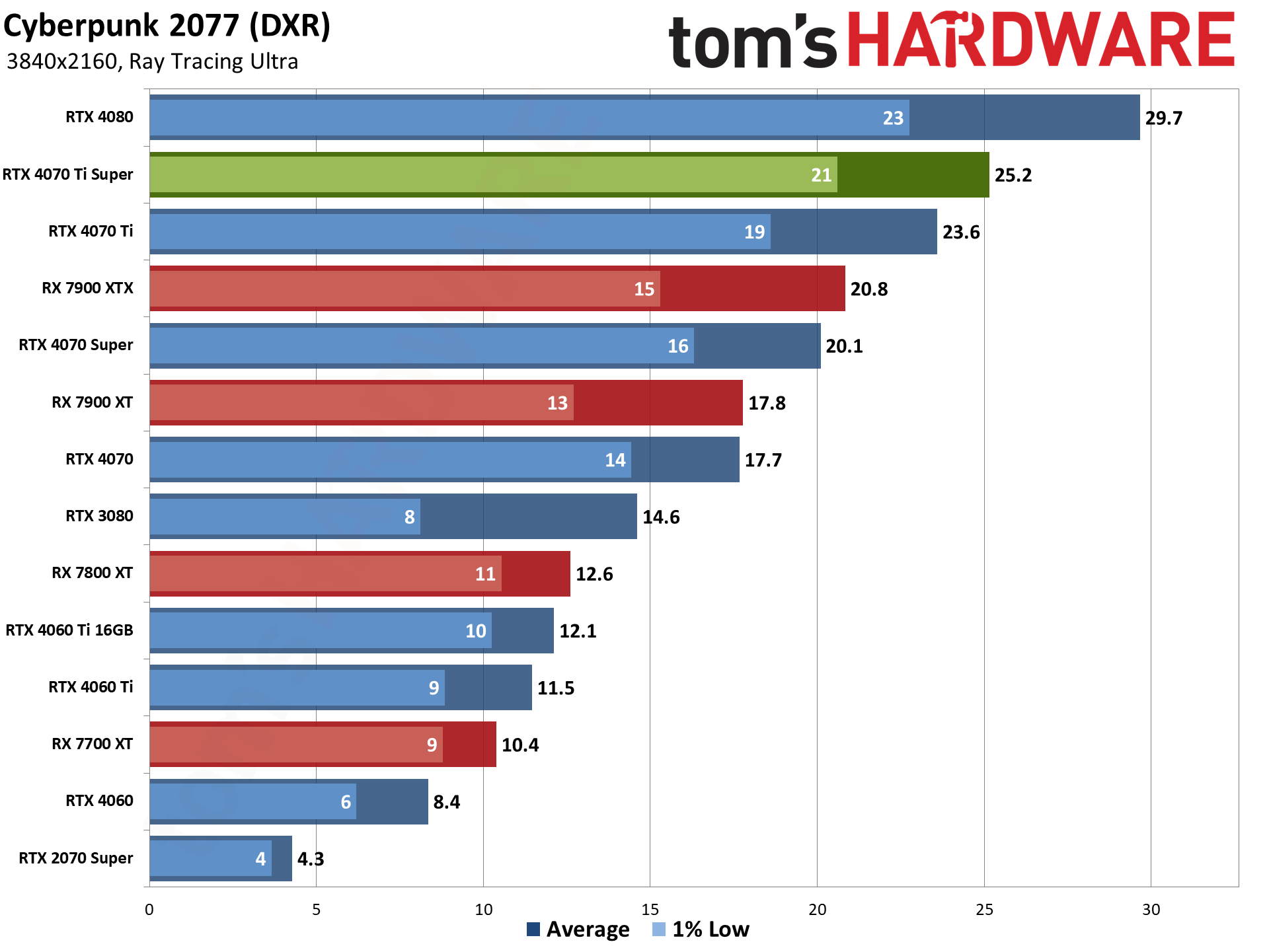
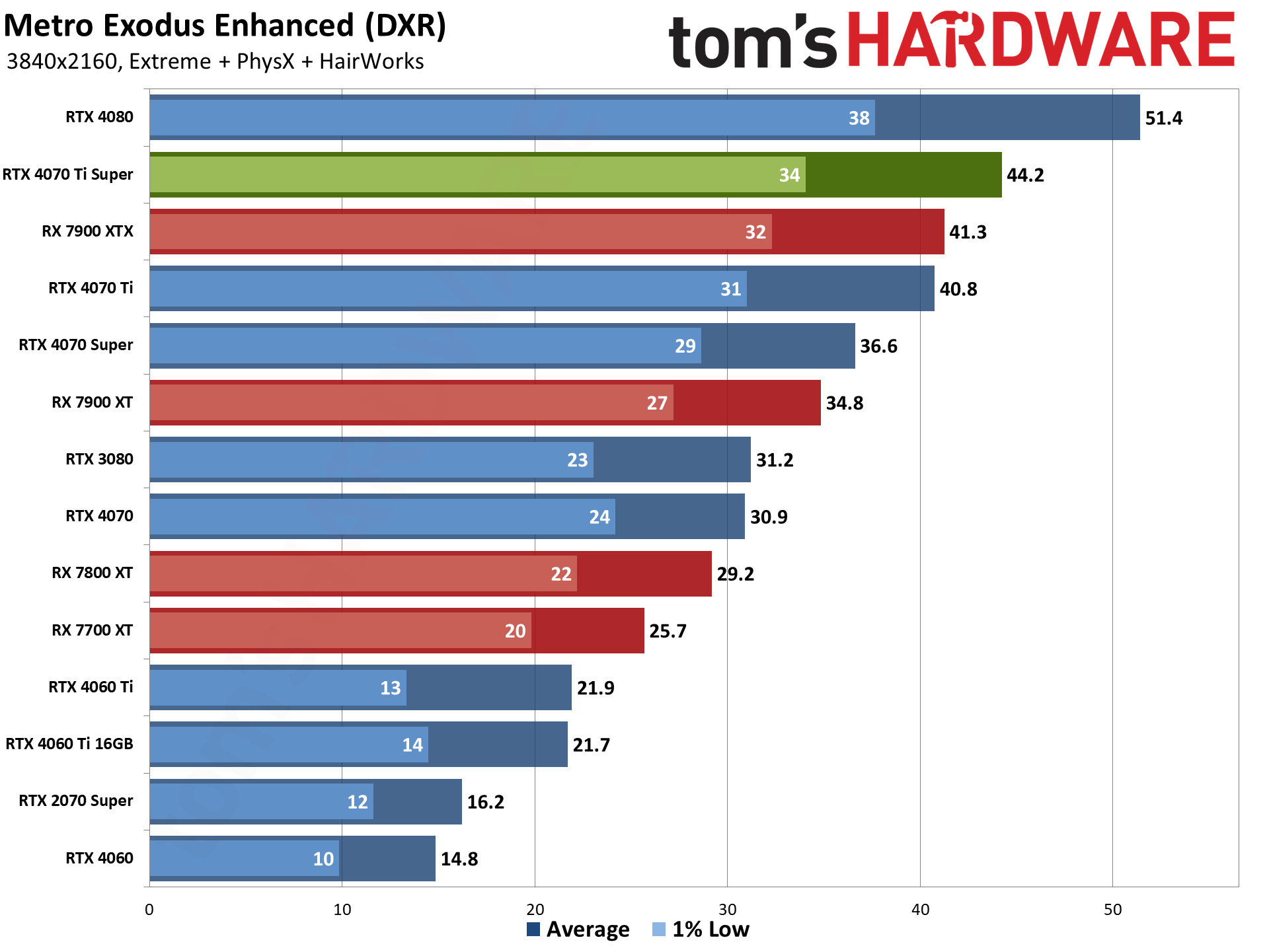
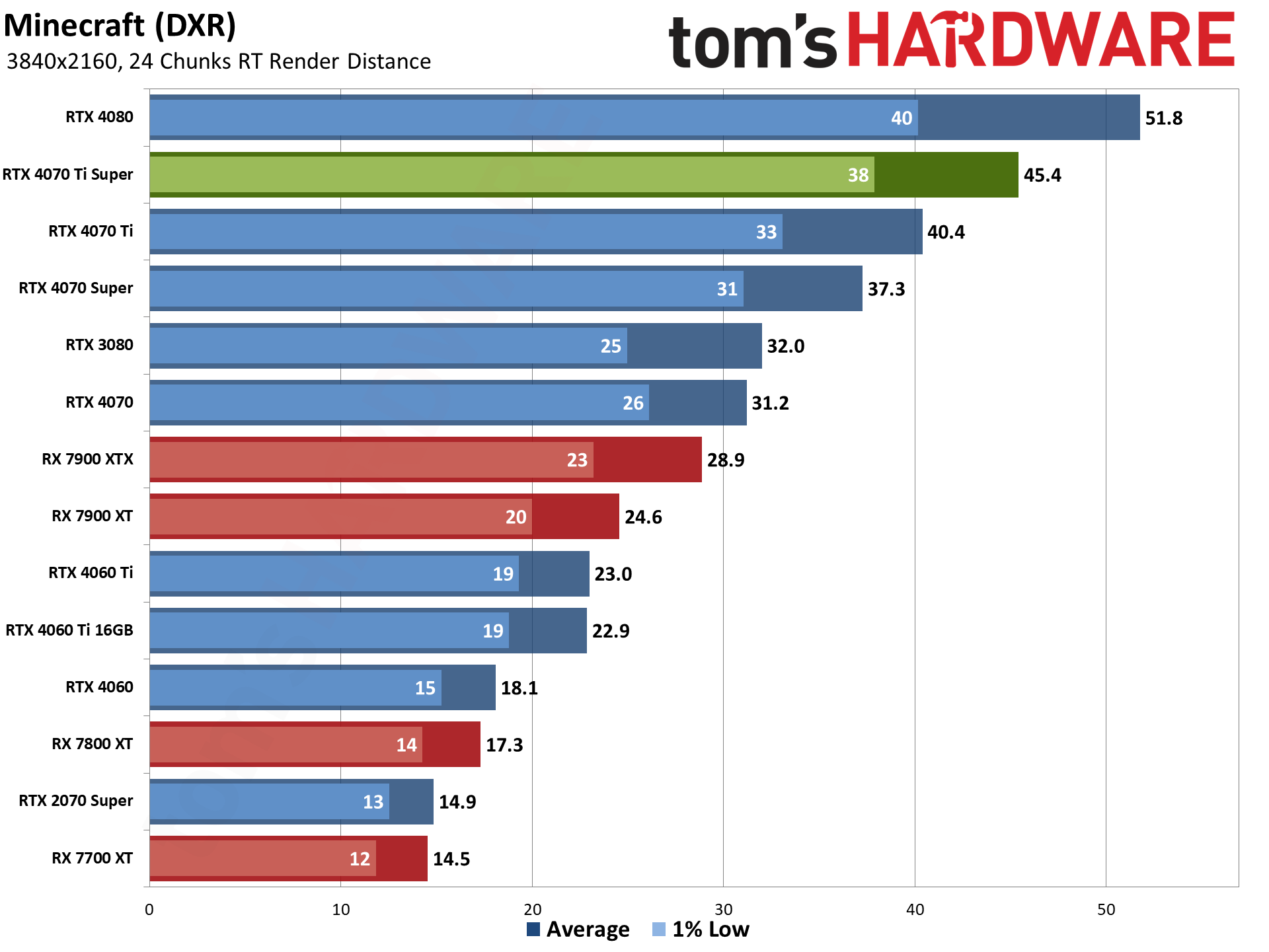
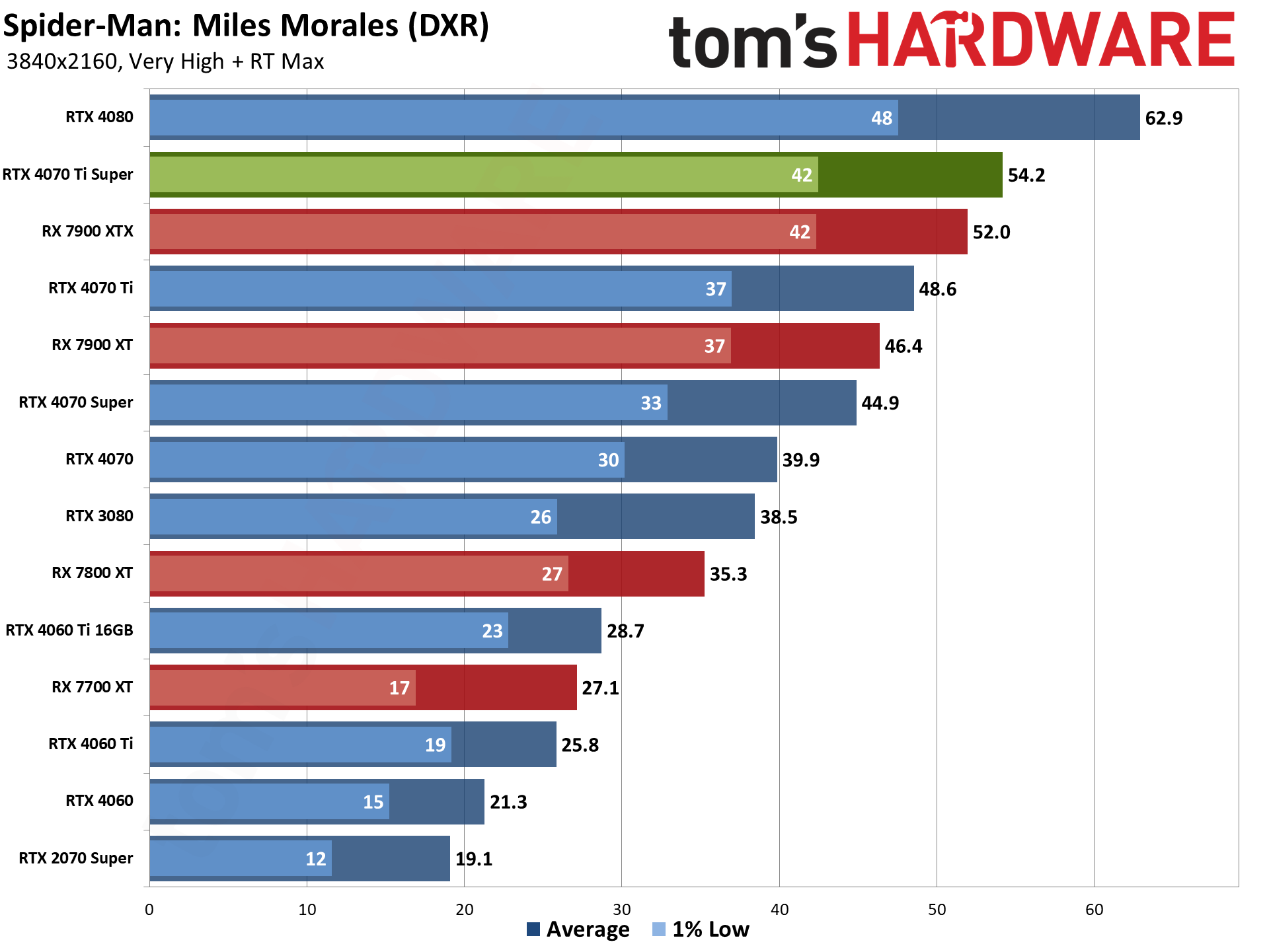
4K ray tracing at native resolution, without upscaling, isn't really viable on any of these GPUs, at least with more demanding games like those in our test suite. Four of the games do manage to at least hit 40 fps or more, with Spider-Man: Miles Morales being the best-performing game at 54 fps, but both Cyberpunk 2077 and Bright Memory Infinite (at least the far more demanding standalone benchmark) only land in the 23–25 fps range.
Overall, the 4070 Ti Super averages 37 fps at 4K in our DXR (DirectX Raytracing) suite, but with Quality 2X upscaling, you can typically improve performance at 4K by 50% or more. That's 10% higher than the vanilla 4070 Ti, again, and 13% slower than the RTX 4080 — basically the same as our overall results.
AMD falls a bit further behind with ray tracing at 4K, though it's not too much of a change relative to 1440p. The 4070 Ti Super outperforms the 7900 XTX by 18% (vs. 17% at 1440p), and beats the 7900 XT by 39% (vs. 34% at 1440p). Again, it seems as though AMD's GPUs need more bandwidth proportionately at higher resolutions and with DXR enabled.
Older Nvidia GPUs really start to struggle at 4K DXR settings. Now the 4070 Ti Super leads the RTX 3080 by 49% (vs. 38% at 1440p), and the 2070 Super clearly was never meant to handle modern games at 4K ultra with ray tracing enabled. The 8GB VRAM certainly plays a role in that, and the 4070 Ti Super is over three times the DXR performance of the 2070 Super at 4K.
RTX 4070 Ti Super 4K Bonus Games
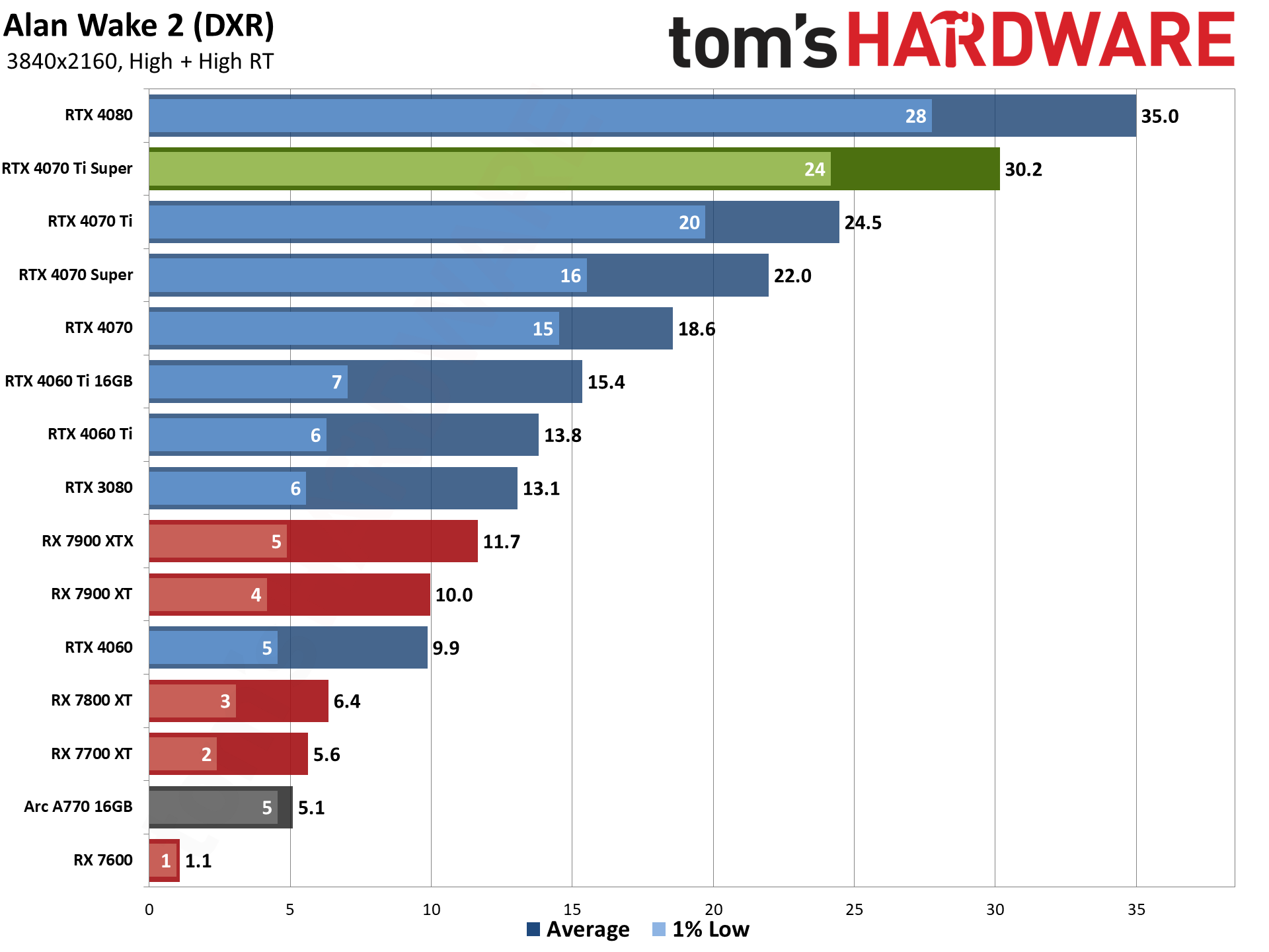
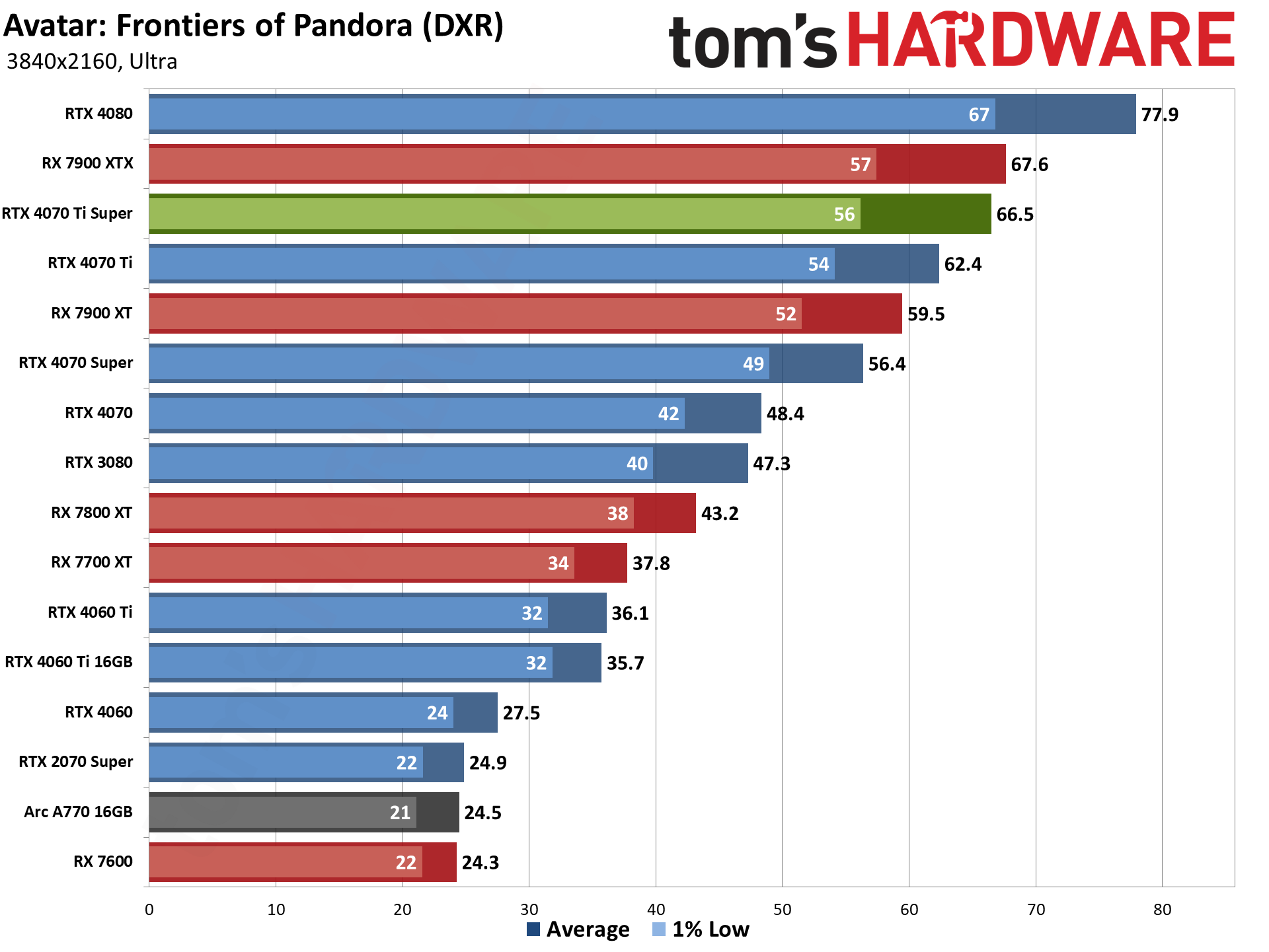
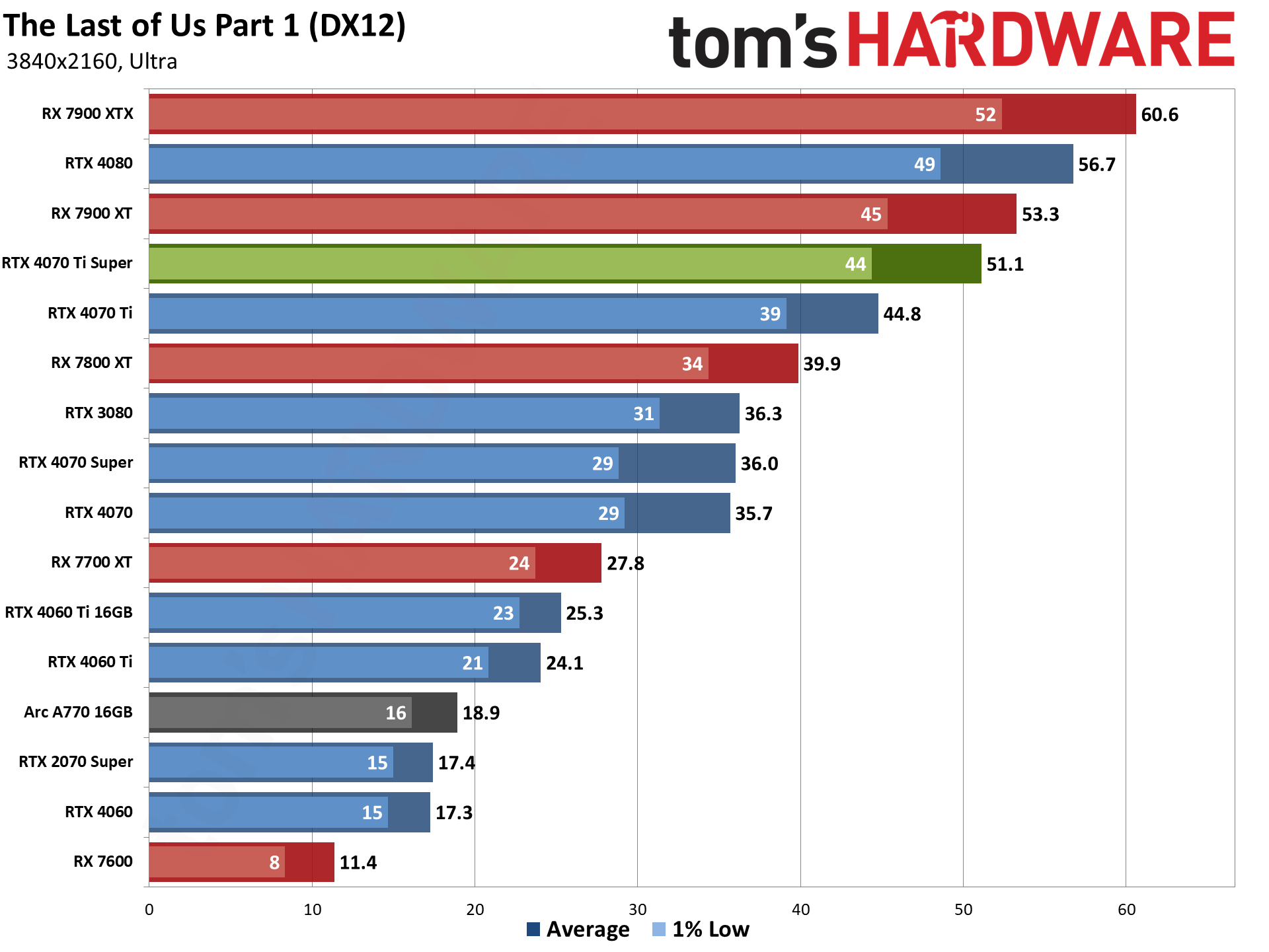
What about maxed out 4K with our more recently released bonus games? Alan Wake 2 is obviously brutal with it's full path tracing, though the 4070 Ti Super does manage a just-barely playable 30 fps with DLSS Quality mode — frame generation nearly doubles that result, but at the cost of latency and responsiveness. That's triple the performance of the 7900 XT, and 158% faster than the 7900 XTX, if you're wondering.
Interestingly, this is by far the biggest lead the 4070 Ti Super has over the vanilla 4070 Ti, with Nvidia's new card outperforming the older model by 23%. It looks like we've finally found a game where 12GB isn't sufficient, though it required full path tracing and 4K (with upscaling) to get there. The 4070 Ti Super is still 14% slower than the 4080, so it hasn't really closed that gap, but at least this is one example of where it lands closer to the higher spec card.
Avatar isn't nearly as brutal, with the 4070 Ti averaging 67 fps using Quality upscaling. That's just slightly behind the 7900 XTX and 12% ahead of the 7900 XT. It's also just 7% faster than the vanilla 4070 Ti, and 15% behind the RTX 4080.
And finally, The Last of Us, Part 1 puts the 4070 Ti Super 16% behind the 7900 XTX, 4% behind the 7900 XT, 14% ahead of the 4070 Ti, and 10% behind the RTX 4080. That makes one more game that at least slightly favors the increased 16GB of VRAM.
- MORE: Best Graphics Cards
- MORE: GPU Benchmarks and Hierarchy
- MORE: All Graphics Content
Get Tom's Hardware's best news and in-depth reviews, straight to your inbox.
Current page: Nvidia RTX 4070 Ti Super: 4K Gaming Performance
Prev Page Nvidia RTX 4070 Ti Super: 1440p Gaming Performance Next Page Nvidia RTX 4070 Ti Super: 1080p Gaming Performance
Jarred Walton is a senior editor at Tom's Hardware focusing on everything GPU. He has been working as a tech journalist since 2004, writing for AnandTech, Maximum PC, and PC Gamer. From the first S3 Virge '3D decelerators' to today's GPUs, Jarred keeps up with all the latest graphics trends and is the one to ask about game performance.
-
Loadedaxe As always, very thorough review. I wish these insane prices would come down to normal levels.Reply
If no one had credit cards, they would not be selling well at all. I am still going to hold out until the offerings from both AMDs and Nvidias next gen arrives. -
AgentBirdnest Wow, that's... disappointing, honestly. Like Jarred mentioned, I too was expecting it to be closer to the 4080. At the very least, I thought it would consistently outperform the 7900XT at 1440p.Reply
I had my eye on this card to finally replace my RTX 2060, but after seeing these benchmarks, I'm not so sure.
Part of me wants to have the better memory specs, in case games coming over the next few years will benefit more from it (Alan Wake seems to show that.) And I may upgrade from 1440p to 4K, but not for at least a year. But futureproofing is hard, since I don't own a crystal ball.
The other part of me thinks the 4070 Super is close enough in performance, and I could use the saved $200 to buy a 4TB SSD that I could make use of. But I don't wanna regret my decision in 2 years.But with either choice, I'm sure I'll be absolutely ecstatic when I upgrade from my 2060. : P
In any case - awesome review, Jarred! You do great work. : ) -
Colif Nvidia repeating what they did with 2070 Super.Reply
4070 TI Super is mostly a 4080
2070 Super was mostly a 2080
Guess old play book worked back then.
8U_S8vrRs-Y -
DavidLejdar Thanks for the detailed review! I don't care much for ray-tracing. So, if I'd upgrade towards 4K, it looks like the RX 7900 XT would be a better option for me - as it is a bit cheaper and with a bit more rasterization performance.Reply
It sure ain't cheap. In my case, I easily miss out on some other stuff though. I.e., it hasn't been until 2023 that I got me a smartphone (and then only a cheap one) - meanwhile at home, a rig with DDR5 RAM already, which should last some years.Loadedaxe said:As always, very thorough review. I wish these insane prices would come down to normal levels.
If no one had credit cards, they would not be selling well at all. I am still going to hold out until the offerings from both AMDs and Nvidias next gen arrives.
Also, here in Germany, we have universal health-care and federal minimum wage of 12.42 Euro. So even with locally low salary (full-time), and after payslip-deductions (such as for that mandatory health-care insurance), and with not too high a rent (as not every owner here needs money for a golf course), it is possible to save up a bit for a rig (without worry of needing a fortune for medical expenses).
And some accountancy helps too. Like, when someone spends i.e. $2 a day on fizzy drinks, drinking water instead means a saving of nearly $60 a month, or $720 a year. Smoking? Smoke some less. And voila, $800 for a GPU, while having improved health.
Not saying that I will get me a new GPU soon, and no reason to overspend of course. And if I'd be living in the countryside, to begin with, I'd would likely need a car and pay insurance for it, even if driving only a few miles every day on empty roads. Etc. But if one can put aside some $40 a month (without interest rate), not that tough to have a modern rig. -
cknobman AMD will likely need to lower the MSRP of the 7900 cards.Reply
Smart move would be to match the 7900XTX msrp to the new 4070ti Super. -
Devoteicon Reply
They are normal.Loadedaxe said:I wish these insane prices would come down to normal levels. -
Eximo All I can say is, go Intel? Need a disruption in the upper mid-range for sure. Even if it is 4070 Super / 7800XT levels of performance that would kick off some re-pricing.Reply -
FoxtrotMichael-1 Reply
I'm not sure what else you spend your money on but inflation has affected every aspect of the economy. Just about everything I buy for a family of 5 is twice as expensive as it was a decade ago.Loadedaxe said:I wish these insane prices would come down to normal levels. -
Gururu Reply
100% agree and watching for itEximo said:All I can say is, go Intel? Need a disruption in the upper mid-range for sure. Even if it is 4070 Super / 7800XT levels of performance that would kick off some re-pricing. -
edzieba ReplyThere's surprisingly little uplift in most games from the memory upgrades
No surprise at all: the 4xxx (and 3xxxs) series have not been memory capacity limited in any of the cards released thus far. Even the 4060Ti 8/16gb only started to see serious performance disparities when settings were cranked far enough for the performance choice to be between "not very good" and "still not very good", so 12GB/16GB is going to offer naff-all in real world testing.
Remember: buy cards based on actual benchmarking (ideally of the games you play), not based on numbers on the box.
